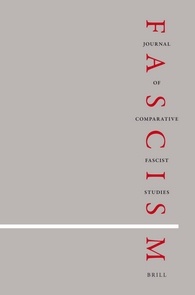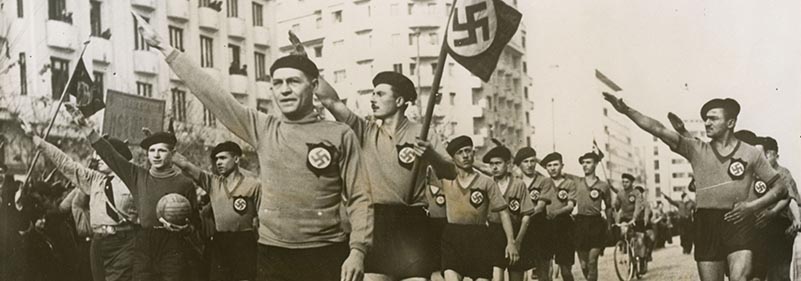
Et droite, et gauche, mais toujours en avant! A personal homage to Zeev Sternhell.
The death of Zeev Sternhell on the 21 June 2020, at the age of 85, is an obvious loss for Comparative Fascism Studies, the History of the modern French political right, and the historiography of European anti-Semitism. But it is no less a loss to the Enlightenment tradition of transcultural humanism, now under threat from so many quarters, and the increasingly urgent pushback against prejudice in all its forms, not just theoretical but activist. Only five years old when the Nazis occupied Poland and set about realizing the Final Solution in earnest, the young Zeev was forced to assume several cultural and national identities in his quest to survive not just physically but emotionally before establishing himself as a highly original historian of the French extreme right and a seminal theorist of fascism’s origins and definition. Never at ease in the ivory tower of academia, he went on to become a thorn in the side of the ‘extreme right’ of Israeli politics, a story whose absorbing details can be found elsewhere. This tribute to his human exceptionalness and exceptional humanity is based on a number of personal encounters with his work and with him which occurred in very different contexts.
My first occurred when I was a highly ingenuous newcomer to fascism studies in the late 1980s and was seeking theoretical support for my campaign to base the analysis of fascism on recognition of its idealistic programme of political, cultural and civilizational renewal which drew on a whole range of ideologies, left and right. In this formative period of doctoral research, it was Sternhell’s Ni droite, ni gauche and his major article on fascism in the The Blackwell Encyclopedia of Political Thought that did much to convince me that I was not entirely wrong or alone, and that it was worth carrying on despite the general incomprehension I was facing.
The second came about in the early 1990s when Sternhell invited me as a postdoc greenhorn to Jerusalem for a largely Francophone conference on the Dreyfus Affair. Here I was duly blooded in the genteel but lethal world of academic unarmed combat by giving the most embarrassing public performance of my life in my first, very public, conference presentation. However, despite messing up spectacularly out of stage fright, Zeev showed me enormous understanding and generosity of spirit as my host in a moment that could have led me to withdraw mollusc-like into my shell for good. For a second time he had come to my rescue, this time in person.
Our paths crossed again after I had started to make my own waves in comparative fascism studies. Amazed that he refused to acknowledge how well Nazism fitted many of his own criteria for identifying a fascist movement, I wrote to him, after which we engaged in some lively email correspondence about whether, in the light of the considerable common ground between our ideal-typical definitions, Hitler’s movement and regime should not be admitted to the Adams-like ‘family of fascisms’. It was a fruitful, good-hearted exchange of views that by his own admission left him teetering on the brink of recognizing its generic fascist credentials as a devastating movement of national-racial rebirth. However, his own shattering experience of the Nazi occupation of Poland as the member of a once privileged Jewish family and the exterminatory consequences of Nazism’s uniquely biological ultranationalism left a powerful and entirely understandable sense of the exceptionalism of The Third Reich which for him precluded its allocation to any generic category of politics, a classification that perhaps smacked of the trivialization and relativization of its monstrous crimes against humanity.
The fourth occasion was when we met at an unlikely international conference on comparative fascism held in Greifswald in eastern Germany when the new millennium was still young. He chose to use his talk to unveil his extraordinary new book Les anti-Lumières: Une tradition du xviie siècle à la guerre froide, which located fascism firmly and brilliantly within the anti-Enlightenment tradition. I would suggest that it is a perspective on generic fascism which assumes fresh resonance in a contemporary world dominated by identitarian forms of xenophobic politics, both state and anti-state which continue to redact global humanism and tolerance from the history of the West. I regard The Anti-Enlightenment Tradition (2009) as the summum of his life’s work as a cultural and political historian.
The fifth encounter grew out of my growing respect for and alarm about Zeev’s personal safety as I followed his adamant determination to use his fame as a public intellectual to keep the minds of his fellow Israelis open to the proposition that the same right to self-determination, land and sovereignty on which he had insisted so vehemently for the Jewish people in Palestine in the early years of the new Jewish nation should be accorded also to the Palestinians displaced by the creation of the state of Israel. It was his principled objection to the Jewish settlement on the West Bank that made him not just the target of intense criticism in the media, but of an abortive bomb attack by an Israeli right-winger. It was this event that sparked some further correspondence between us when I had expressed my outrage at what had happened and relief at his survival. Characteristically, he communicated no sense of resentment or hatred at such a crude, at bottom nihilistic, attempt to silence a voice of intercultural humanity and tolerance, despite its painful resonances with the lethal fanaticism to which he and his loved ones had been so cruelly exposed in his youth.
My commitment to my own version of the definition, nature and origins of fascism meant I could never fully endorse Sternhell’s no less idiosyncratic theory of its origins in fin-de-siècle France. Nevertheless, I retained and retain immense respect for the unusual depth of the underground reservoir of humanity that he painstakingly sculpted out of the rocks of dogmatism in the years of his direct experience of anti-Semitism in Poland, his academic confrontation with its virulence in 19th and 20th century France, and his encounters with the Israeli religious and secular right and compassion with its Palestinian victims. What animated him was his passionate belief in the power of values, of ideas, of ideals despite and sometimes precisely because of their irrationality and utopianism (here Georges Sorel was an important influence). He had lived ‘on his skin’ the destructive force of political myths in times of societal crisis to open up affective and psychological channels in human communities which in particular conjunctions of events allow History to take unexpected and catastrophic turns even in the most apparently civilized, liberal and ‘modern’ of societies.
This already places him securely in my personal Pantheon of outstanding intellectual visionaries. But over and above his originality of mind, Sternhell stood out for me in particular because of his refusal, once he had established himself as a world expert on his subject, to take refuge in some comfortable university sinecure far behind the front lines of History. He continued to refine and apply his highly un-theoretical belief in the importance of confronting in a spirit of intelligent but steadfast pacifism new but no less dehumanizing forms of racism, prejudice and ultranationalism arising in his own back yard. I doubt whether many in fascism studies, myself included, would have shown this courage and integrity in his circumstances.
Zeev Sternhell was a career academic in the fullest sense of the word, constantly striving for a higher synthesis of his academic research and publications, on the one hand, and his personal and civic existence as an individual citizen on the other. Effortlessly multi-lingual, at home everywhere and nowhere, an instinctive humanist and protagonist of social justice for all, he surely, no less than George Mosse before him, is to be regarded as both a patron and pioneer of comparative fascism studies as a subdiscipline whose educative value should regularly spill out spontaneously and non-violently from the classroom and lecture hall into the media, TV studio, and on occasion even into the streets. Our world (I speak for the province of academia that I inhabit) is clearly impoverished without him. It is thus for those of us committed to fascism studies for reasons not just of promotion and quantifiable ‘impact’, but of humanistic and political engagement to enrich our field of studies even more zealously in his memory. This can be achieved through our own local battles against fake nationalist memories and against the insidious othering of entire segments of humanity in a misconceived quest for ‘identity’, whether it is promoted by overtly fascist movements, xenophobic, pseudo-liberal populisms, or illiberal democracies with their sawdust Caesars and self-appointed Tsars.
In his comment on Gilbert Michlin’s Aucun intérêt au point de vue national: La grande illusion d’une famille juive en France (2001), Zeev Sternhell wrote (in French):
"My whole life, right up to this moment, I have wanted to know why, how, it was possible, simply because I existed, to plunge me into this hell. To know why, how my father, my mother, my friends, entire families, for the same reason had to perish as well. These questions I have asked myself a hundred times, a thousand times, and I have never been able to answer them, or at least, find the time to answer them."
Maybe, in our own way, we should make time as ‘experts on fascism’ to apply our specialisms to answering some of the disturbingly similar questions that contemporary history is posing to liberal democracy today. Zeev Sternhell was a remarkable survivor. It was a privilege to have him on the founding editorial boards of both Fascism and COMFAS. I suggest we should all do what we can to ensure that his spirit survives in our own contributions to academia and society, however modest.
Roger Griffin
Co-founder of Fascism and COMFAS

